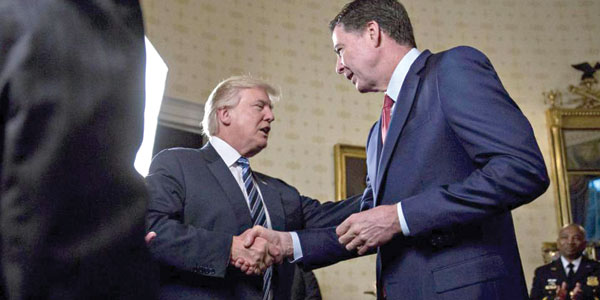
Si se trataba de los años setenta, la despedida repentina del director del FBI, James Comey, habría marcado el comienzo del final de la presidencia de Donald Trump.
Sin embargo, no estamos en los años 70.
El departamento de Comey estaba a cargo de investigar si había o no posibles lazos entre la campaña presidencial de Trump y Rusia. Sin embargo, los senadores republicanos no parecen estar incómodos con que el presidente Trump haya despedido a la persona que estaba investigando su propia campaña.
Carl Bernstein, un periodista cuyo reportaje para The Washington Post ayudó a liderar la renuncia del presidente Nixon en 1974, dijo recientemente que le preocupa que los republicanos en el Congreso no hayan expresado más disgusto sobre el tema. Está claro por qué no lo han hecho: el Partido Republicano no es el mismo partido que fue durante la década de 1970.
Los miembros republicanos del Congreso durante la presidencia de Nixon fueron heroicos. Fueron los miembros del propio partido político del presidente quienes hicieron las preguntas y levantaron las banderas rojas. Pero hoy, los políticos dicen lo que su partido dice y hacen lo su partido haga. No sólo muchos republicanos están ocultando su opinión sobre el tema; sino que muchos de ellos han apoyado públicamente la acción del Presidente.
“¿Por qué fue despedido Comey?”, Probablemente te preguntas. ¿Había Comey encontrando demasiadas evidencias de lazos entre los rusos y Trump? ¿Fue la propia paranoia del presidente Trump lo que le hizo despedir a Comey? Todavía no se han dado respuestas claras. De hecho, las respuestas a estas preguntas podrían nunca ser conocidas.
Como dijo el ex director de inteligencia nacional James Clapper, esto fue “otra victoria en el marcador… para ellos (los rusos)”.
_______________________________________________________________________________
Is this the beginning of the end?
Commentary by Dermidio Juez-Perez
If this were the 1970s, the sudden firing of FBI Director James Comey would’ve marked the beginning of the end of Donald Trump’s presidency.
However, this isn’t the ’70s.
Comey’s department was in charge of investigating whether or not there were potential ties between Trump’s presidential campaign and Russia. Yet Republican senators don’t seem to be uneasy with President Trump firing the person who was investigating his campaign.
Carl Bernstein, a journalist whose reporting for The Washington Post helped lead to President Nixon’s resignation in 1974, said recently that he’s concerned that Republicans in Congress haven’t voiced more displeasure on the subject. It’s clear why they haven’t: The Republican Party isn’t the same party it was during the 1970s.
Republican members of Congress during Nixon’s presidency were heroic. It was the members of the president’s own political party who asked the questions and raised the red flags. But today, politicians say as their party says and do as their party does. Thus, not only are many Republicans reserved in their opinion on the controversial subject; many of them are going so far as to publicly supporting the president’s action.
“Why was Comey fired?” you’re probably asking. Was Comey finding too much evidence of ties between the Russians and Trump? Was it President Trump’s own paranoia that made him fire Comey? Clear answers have yet to be given. Indeed, the answers to these questions might never be known.
As former national intelligence director James Clapper said, President Trump’s firing of Comey is “another victory on the scoreboard … for them (the Russians).”










